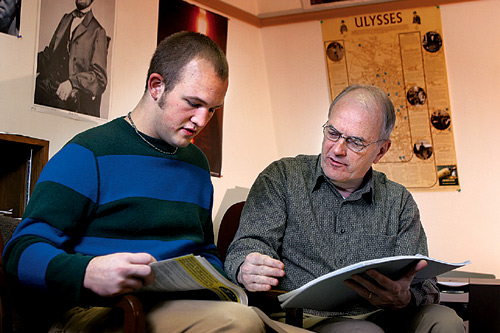An expert on property taxation and land issues, Jerome Heavey, professor of economics and business, has lived in Ireland and done research on the history of Irish land reform and tenants’ rights. “In the 1870s most of the land in Ireland was owned by a few thousand absentee English landowners,” he says. “After (British Prime Minister) Gladstone pushed bills (in Parliament) to allow Irish tenants to buy the plots they were farming, some 400,000 Irish tenants became landowners and the economic base of the country.”
Heavey is leading the Lafayette program in London this spring and will spend the rest of the year on sabbatical in Sydney, Australia. While on sabbatical he hopes to finish a manuscript on Michael Davitt, who led the Irish land reform effort in 1879-82, and research the Irish experience in Australia.
“There were a lot of people and money moving between Ireland and Australia in the late 1800s,” says Heavey. “Both countries were seeking independence from Britain. But there were differences, too. Australia had a lot more land and fewer absentee landowners.”
An elective course in economics originally got then-English major Heavey interested in the subject. “I had a great teacher, Mr. Kenny, and he got me interested in economics,” he says. So despite his English degree, he applied to graduate school in economics. Finishing his doctoral coursework with a wife and infant daughter, he began looking for a job. Coincidentally, Lafayette was looking for an instructor to teach urban economics, the focus of Heavey’s graduate studies.
“When I drove from Penn State for the interview, I parked by Markle Hall and looked across the Quad to Pardee Hall,” Heavey says. “I thought, ‘This is the place.’ I’d gone to graduate school because I wanted to be a college teacher, and this campus matched the ideal college of my imagination.”
Heavey hadn’t finished his doctoral dissertation, and quickly found out that with teaching, he had little time to work on it. “Nowadays I’d never get hired,” he said. “But back then there were seven of us in the department who were teaching and at the same time trying to finish our dissertations. It was a revolving door” (of young scholars trying to teach and finish their dissertations). “I’m the only one of those seven still here. The department is much better now. It was a long, slow process to improve. Now our faculty includes quite a few scholars with national reputations. We’re the best economics department in the Lehigh Valley. In my early years I doubted that we would ever be able to say that.”
Heavey spent a year-and-a-half in Moscow as a fiscal reform consultant for the Moscow Oblast, a regional government similar to the state of Maryland, 1994-95. He has served as head of Lafayette’s department on and off for ten years.
Why has he stayed at Lafayette? “It’s a small, excellent college with a beautiful campus and friendly colleagues,” says Heavey. “I like the students, and I like being a member of the faculty here.”
“My career direction was directly influenced by Jerry,” said Tim Hylan ’88, director of Pfizer’s regional medical research specialist team, a group of psychiatrists and neurologists in New York City. “Late in my senior year, I was still not sure what I was going to do. I was pursuing one job option that deep down I didn’t think was right for me. In talking to Jerry, he suggested I think strongly about graduate school in economics. I had not really considered that because I didn’t think I could afford it nor did I know what it all entailed. He helped me understand the graduate application process, put me in touch with some programs, and helped with references.”
Although his current job in pharmaceuticals is somewhat removed from his doctorate in economics, Hylan says, “Many of the principles I learned with Jerry have helped me. The overriding one, of course, is that life is governed by scarcity and we all have to make choices. Jerry helped me see that and learn the tools of economics. So many doors were opened to me after I received my Ph.D. Without Jerry’s support and encouragement I know I would not be where I am today. I live back in the area now in Bucks County, and sometimes drive by the office building where I had that job interview. Every time I do, I thank Jerry and Lafayette for showing me another option.”
Highlights
Publications: “The Moonlighting Penalty: Incidence of the Excess Social Security Tax,” Public Finance Review 30.4 (July 2002): 310-19; “Fat Tax,” with Edward Gamber, Baltimore Sun, March 4, 1996.
Honors: Fulbright Lectureship, University of Warsaw, 1994-95, declined.
Achievements: Head, economics and business department, 1980, 1982-85, 1997-2002; fiscal reform consultant, Moscow Oblast, 1994-95; co-led interim courses to Ireland 1998, 2001; leading Lafayette program to Huron University, England, spring 2003.
Contact: (610) 330-5300, heaveyj@lafayette.edu

Jerry Heavey and David Mitchell ’05, music major, discuss issues raised in the intermediate microeconomic theory course Heavey teaches.
